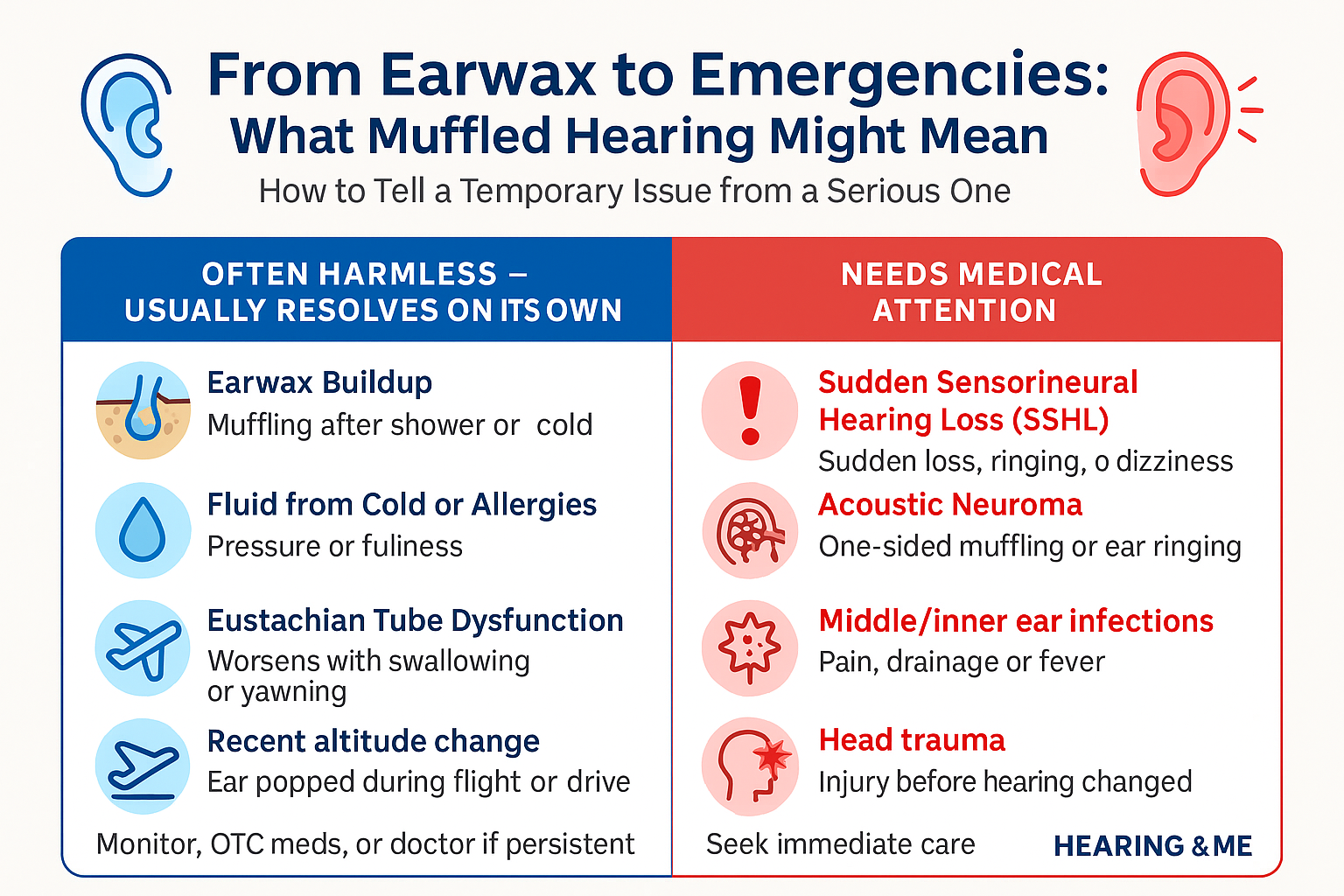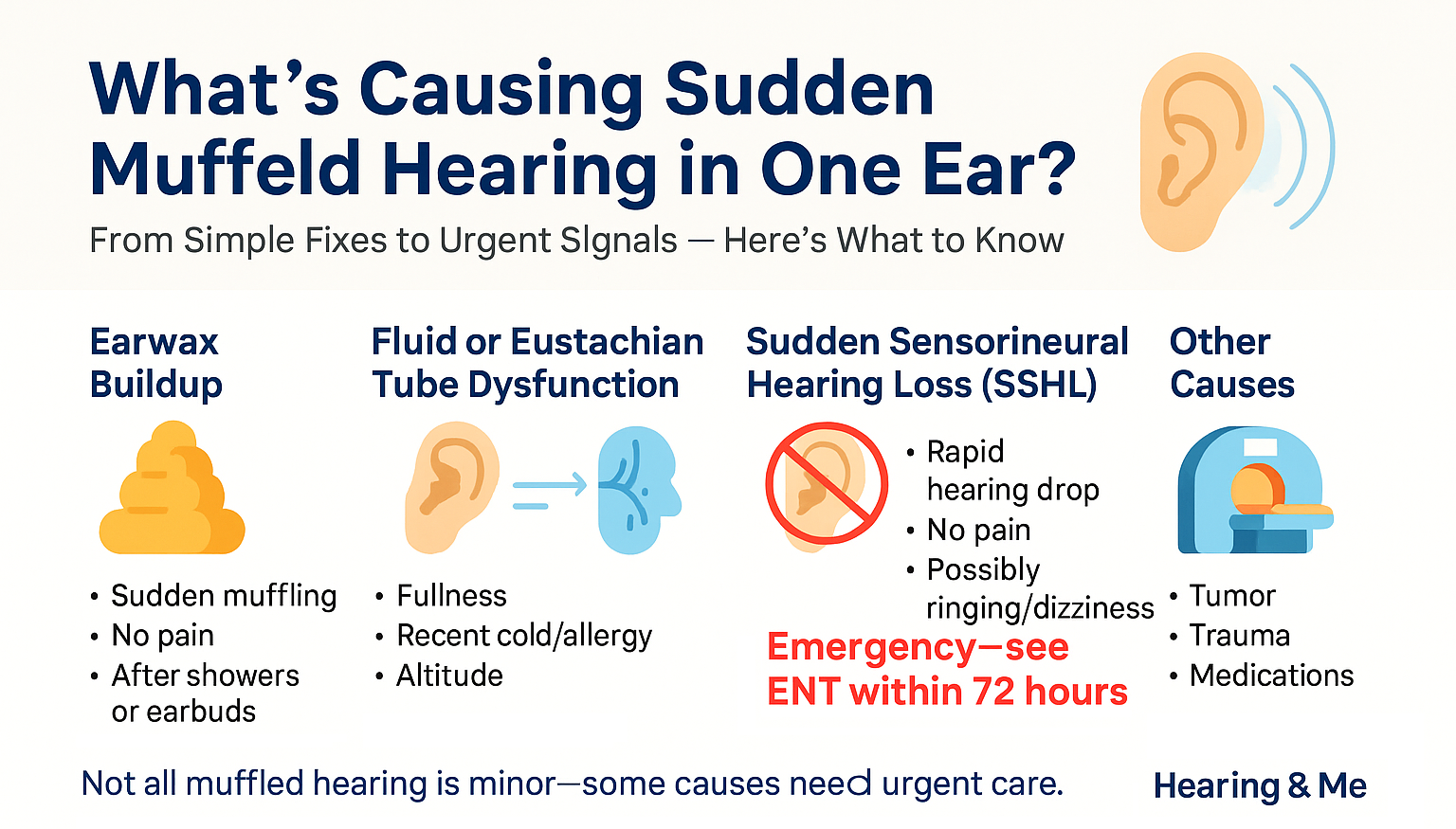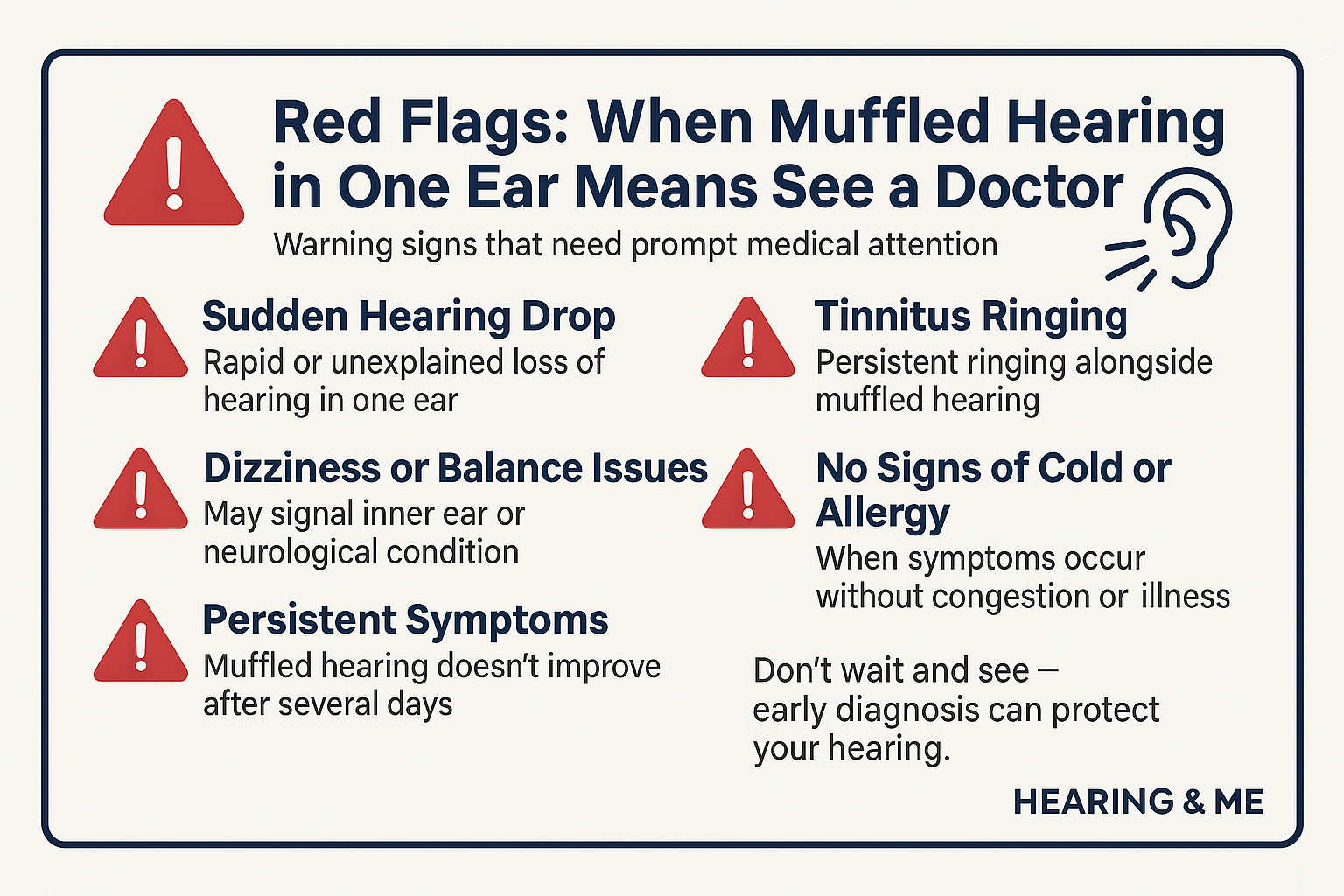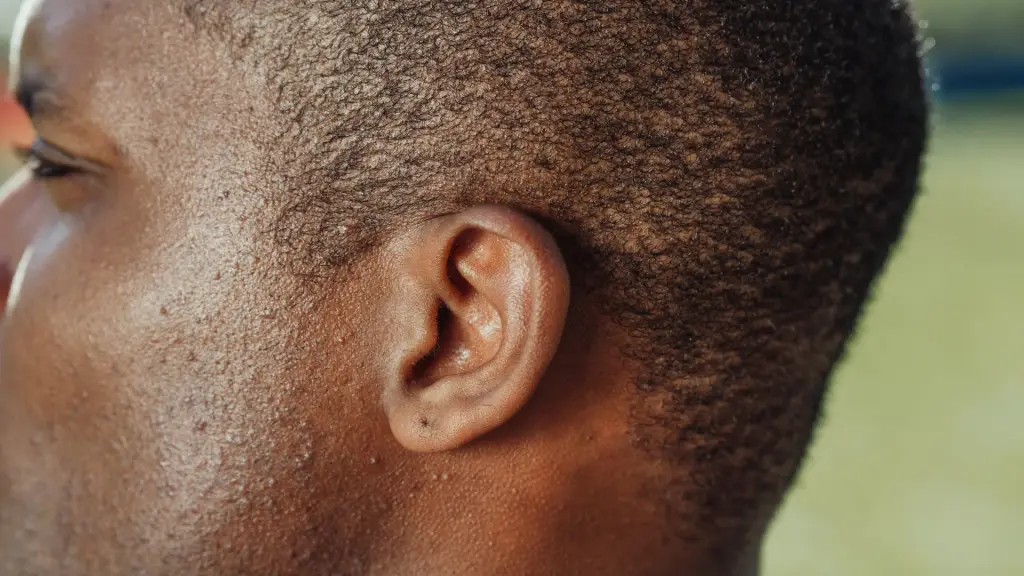It happens without warning—your ear suddenly feels blocked, like you’re underwater or wearing earplugs on one side. Sounds become muffled, voices lose clarity, and everything feels just a bit off. You might think, “It’s probably just wax or a cold,” but sudden hearing muffling in one ear can have many causes—some harmless, others more serious.
This kind of hearing change, even if painless, deserves your attention. It could be something simple and temporary, like fluid buildup or earwax. But it could also signal an infection, inner ear disorder, or even a medical emergency like sudden sensorineural hearing loss (SSHL)—where timing is critical for recovery.
In this article, we’ll explore what causes sudden hearing muffling in one ear, how to recognize red flags, what tests doctors use, and how to treat or manage it. Whether your symptoms just started or have lingered for a few days, this guide will help you take the next right step toward clearer hearing and peace of mind.
What Does Muffled Hearing in One Ear Feel Like?
Muffled hearing doesn’t always mean total hearing loss—it’s more like partial blockage or distortion. Sounds may be present, but they’re dulled, fuzzy, or distant, creating a sensation that’s both uncomfortable and disorienting.
Common Symptoms and Sensations
If you’ve ever asked yourself, “Why does my ear sound like it’s plugged?”, you’re not alone. People often describe sudden muffled hearing in one ear as:
A sensation of pressure or fullness
Hearing like you’re underwater
Sound seeming quiet, distant, or filtered
Difficulty understanding speech, especially in noisy places
Feeling like the ear needs to “pop” or clear
Accompanying symptoms such as tinnitus (ringing), dizziness, or imbalance
Unlike gradual hearing loss, this change is usually noticeable right away—even if it doesn’t come with pain or other visible symptoms.
How to Know It’s Not “Just a Cold”
While temporary hearing muffling often occurs with colds, allergies, or sinus infections, it’s important to look out for signs that suggest something more:
If your symptoms last more than a few days after your cold clears
If you have no signs of illness, but hearing still feels muffled
If there’s a sudden drop in hearing with no clear cause
If there’s no improvement after trying ear drops or decongestants
In these cases, it’s not just congestion—it’s a signal your ear may need professional attention.
Next, we’ll dive into the most common—and some less obvious—causes of sudden muffled hearing in one ear.

Top Causes of Sudden Muffled Hearing in One Ear
A suddenly muffled ear can feel alarming, especially when it seems to come out of nowhere. The good news? Many causes are treatable or temporary. The not-so-good news? Some require urgent medical care to avoid permanent damage. Let’s break down the most common culprits.
Earwax Buildup
One of the most benign causes, impacted earwax can block the ear canal and suddenly muffle sound. It often comes on fast after:
Using cotton swabs
Wearing hearing aids or earbuds frequently
Swimming or showering (moisture expands wax)
While annoying, it’s easily treated by a healthcare provider. Avoid poking around with cotton swabs, which can push wax deeper.
Fluid Buildup or Eustachian Tube Dysfunction
When your Eustachian tube (which connects the ear to the back of the throat) becomes blocked, it can trap fluid in the middle ear. Common triggers include:
Colds, allergies, or sinus infections
Flying or altitude changes
Smoking or respiratory irritation
This fluid creates a sensation of pressure and muffling. Symptoms usually resolve on their own, but lingering cases may need decongestants or a doctor’s help.
Middle Ear Infections (Otitis Media)
Infections in the space behind the eardrum can cause:
Pain
Pressure
Drainage
Temporary hearing loss
In adults, these are less common but more likely to cause complications if untreated.
Inner Ear Disorders and Sudden Sensorineural Hearing Loss (SSHL)
This is one of the more serious possibilities. SSHL typically causes a rapid, unexplained loss of hearing in one ear—often within hours or a day. It’s considered a medical emergency and may include:
Muffled or absent sound in one ear
Ringing (tinnitus)
Dizziness or balance issues
Treatment with steroids within 72 hours offers the best chance for recovery. Don’t delay evaluation if your hearing drops suddenly.
Other Possible Causes
Barotrauma: Pressure injury from scuba diving, flying, or loud blasts
Acoustic neuroma: A slow-growing, benign tumor that can cause progressive muffling and imbalance
Head trauma: Injury can damage the ear structures or auditory nerve
Medication side effects: Certain antibiotics or diuretics can impact hearing in rare cases
Understanding what’s behind the muffled sound is critical—because your ears may be whispering something important about your overall health.

When Should You Worry About Muffled Hearing?
While most causes of sudden muffled hearing are temporary and treatable, there are certain signs that shouldn’t be ignored. If you experience any of the following symptoms, it’s important to seek medical attention as soon as possible.
Red Flags That Suggest Serious Conditions
Sudden and Severe Hearing Loss
If you experience a sharp, rapid drop in hearing in one ear, especially with no obvious cause, this could indicate sudden sensorineural hearing loss (SSHL). This is a medical emergency that requires prompt treatment, usually within 72 hours, to maximize recovery chances.
Dizziness or Balance Issues
If muffled hearing is accompanied by dizziness, vertigo, or balance problems, this could point to a vestibular issue or an inner ear disorder, such as Ménière’s disease or labyrinthitis. These conditions affect both hearing and balance, requiring specialized care.
Persistent or Recurring Symptoms
If muffled hearing doesn’t improve after several days, or if you frequently experience ear fullness or pressure, this might indicate fluid retention, a chronic middle ear infection, or an Eustachian tube dysfunction that’s not resolving on its own.
Pain, Drainage, or Bleeding
Hearing loss accompanied by pain, drainage, or bleeding from the ear could signal a more serious condition, such as an ear infection, eardrum rupture, or even a tumor. Immediate medical evaluation is needed to prevent further damage.
Tinnitus (Ringing)
If the muffled hearing is accompanied by persistent tinnitus (ringing in the ear), this may be a sign of nerve damage or an issue like acoustic neuroma or SSHL. Tinnitus can also signal ongoing hearing damage or infection.

Temporary vs Permanent Causes
Many times, muffled hearing is temporary, especially when caused by:
Earwax impaction
Fluid buildup from a cold or sinus infection
Minor Eustachian tube dysfunction
These usually resolve with home remedies or over-the-counter treatments. However, if the issue persists or worsens, it’s important to get checked out.
Permanent causes of muffled hearing—such as sensorineural hearing loss or tumors—need urgent medical intervention. Don’t wait for symptoms to improve on their own, as early diagnosis can make a significant difference in the outcome.
Next up, we’ll look at how sudden hearing loss is diagnosed and what to expect during your medical visit.
How Is Sudden Hearing Loss Diagnosed?
If you’re experiencing sudden muffling in one ear, getting an accurate diagnosis is the first step toward treatment and relief. Your doctor—or more likely an ENT (ear, nose, and throat specialist)—will use a combination of tools and tests to determine what’s going on and what to do next.
Medical Evaluation and Hearing Tests
Here’s what a typical diagnostic process may involve:
Medical History Review
You’ll be asked when the muffling started, whether it came on suddenly or gradually, and if there are other symptoms like pain, ringing, or dizziness.Otoscopy (Visual Ear Exam)
A doctor uses a special tool to inspect your ear canal and eardrum for wax, fluid, inflammation, or infection.Tympanometry
This test evaluates middle ear pressure and eardrum movement to identify blockages or fluid buildup.Pure Tone Audiometry
You’ll wear headphones and respond to a range of tones to measure your hearing sensitivity at different frequencies. This reveals which part of the hearing pathway may be affected.Speech Recognition Testing
This assesses how well you understand spoken words, especially in noisy settings.Imaging (if needed)
If there’s concern about nerve-related issues or a tumor, an MRI or CT scan may be ordered. This helps detect conditions like acoustic neuroma or structural abnormalities in the inner ear.
What the Results Tell You
These tests will help determine:
Whether the hearing loss is conductive (blockage-related and often temporary)
Or sensorineural (nerve or inner ear damage, which is often permanent if untreated)
This distinction is crucial because it guides your treatment plan—from simple earwax removal to urgent steroid therapy or further neurological investigation.
Prompt diagnosis not only improves the chances of recovery, but also helps rule out serious underlying conditions. If your hearing feels off, don’t guess—get it checked.
Next, we’ll explore how to treat sudden muffled hearing, both at home and with professional help.
Treatments and Relief Options
The treatment for sudden muffled hearing in one ear depends entirely on the underlying cause. Some cases can be resolved with simple home care, while others require immediate medical attention to prevent permanent damage.
At-Home Remedies (For Mild or Common Causes)
If your symptoms are mild and you suspect a non-emergency cause (like a cold or earwax), you may try the following:
Warm Compresses: Can relieve pressure and promote fluid drainage if related to congestion.
Decongestants or Antihistamines: Over-the-counter meds can help relieve Eustachian tube dysfunction caused by colds or allergies.
Yawning, Swallowing, or the Valsalva Maneuver: These techniques help equalize ear pressure, especially after altitude changes.
Ear Drops: Only use if prescribed or safe for your symptoms—never if you suspect a ruptured eardrum.
Medical Treatments
Depending on your diagnosis, your doctor may recommend:
Professional Ear Cleaning: To remove wax blockages using safe suction or irrigation.
Antibiotics or Antifungal Medications: For bacterial or fungal infections in the outer or middle ear.
Steroid Therapy: Often used for sudden sensorineural hearing loss (SSHL) to reduce inflammation and preserve hearing—most effective if started within 72 hours.
Myringotomy or Ear Tubes: For chronic fluid buildup behind the eardrum, often seen in recurrent Eustachian tube dysfunction.
Surgical or Specialist Care: For more complex issues like tumors, ruptured eardrums, or acoustic neuroma.
How to Protect Your Ears and Restore Hearing Safely
Whether your hearing returns fully or only partially, follow these tips to support long-term ear health:
Avoid exposure to loud noises and sudden pressure changes (e.g. underwater diving, air travel during colds)
Keep ears dry and clean, especially if you’ve had infections
Use ear protection in noisy environments
Stay hydrated and manage sinus/allergy issues proactively
Schedule regular hearing checkups if you’ve had previous issues
Quick action and appropriate care can make a huge difference in recovery and prevention of future hearing loss.
Conclusion: Don’t Ignore a Muffled Ear – It Could Be Telling You Something Important
A muffled ear might seem like a small inconvenience—until it lingers or worsens. Whether it’s caused by wax, congestion, or something more serious like sudden hearing loss or an inner ear disorder, sudden muffling in one ear is your body’s way of saying, “Pay attention.”
The good news? Many causes are treatable if caught early. The not-so-good news? Waiting too long can mean permanent hearing damage or missed signs of a deeper health issue.
If your ear feels blocked, if your hearing changed overnight, or if the muffling just won’t go away—don’t wait it out. Get it checked. A simple hearing test or ear exam can give you answers, peace of mind, and in many cases, a quick solution.
Your hearing is too important to risk. When in doubt, trust your instincts—and let a professional help you make things clear again.
Frequently Asked Questions
Can a cold cause muffled hearing in one ear?
Yes. Colds often lead to Eustachian tube dysfunction, where fluid gets trapped behind the eardrum. This creates a feeling of fullness and muffled hearing, usually on one side. The symptom often resolves as the cold clears, but if it persists, you should see a doctor.
How long does muffled hearing usually last?
It depends on the cause:
Earwax or fluid buildup: Often resolves within a few days after treatment
Middle ear infection: May take up to 1–2 weeks to clear
Sudden sensorineural hearing loss: Needs urgent treatment; recovery may take weeks and is not always guaranteed
Persistent muffling beyond a few days should be evaluated by a professional.
When should I see a doctor?
You should see a doctor if:
Hearing loss is sudden or severe
There’s no improvement after a few days
You experience pain, dizziness, ringing, or ear drainage
The muffled sensation affects your balance or quality of life
Is sudden muffled hearing always serious?
Not always. Some causes—like wax or pressure imbalance—are mild and reversible. But sudden changes without a clear cause, especially with additional symptoms, can signal a serious medical condition like SSHL or an inner ear disorder.
Can stress or anxiety cause ear pressure?
Yes. Stress can lead to jaw clenching or muscle tension, which may affect the Eustachian tubes or temporomandibular joint (TMJ), causing ear fullness or a muffled sensation. However, true hearing loss should always be ruled out first.
Should I use ear drops or wait it out?
Ear drops may help with wax softening or outer ear irritation, but avoid using them unless:
Your eardrum is intact
You don’t have drainage or pain
They’re recommended by a pharmacist or doctor
For sudden or unexplained muffled hearing, it’s safer to seek medical evaluation first.






